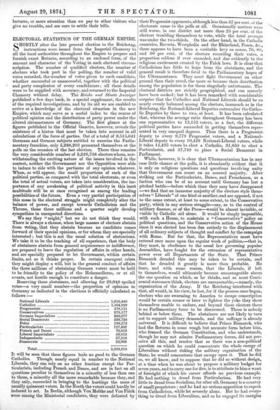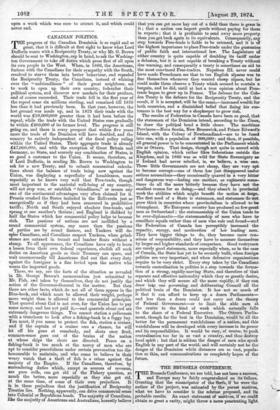'ELECTORAL STATISTICS OF THE GERMAN EMPIRE.
SHORTLY after the late general election to the Reichstag, instructions were issued from the Imperial Chancery to all the local authorities throughout the Empire to prepare and furnish exact Returns, according to an enclosed form, of the amount and character of the Voting in each electoral circum- scription. The number of qualified electors, the number of electors who took part in the polling, the number of valid votes recorded, the-number of votes given to each candidate, whether successful or unsuccessful, together with the political and party complexion of every candidature ; all these details were to be supplied with accuracy, and returned to the Imperial Chancery without delay. The Reich und Stauts A nzeiger • published a few days back, in a special supplement, the results of the required investigations, and by its aid we are enabled to arrive at a knowledge of the electoral situation in the new Empire, which may serve as a useful index to the course of political opinion and the distribution of party power under the altered circumstances of Germany. The first glance at the figures published in the Official Gazette, however, reveals the existence of a hiatus that must be taken into account in all calculations of the force of parties. Out of a total of 8,515,041 Germans and German subjects entitled to exercise the Parlia- mentary franchise, only 5,288,203 presented themselves at the polls on the occasion of the last election. There thus remains the very considerable number of 3,226,738 electors whom, not- withstanding the exciting nature of the issues involved in the contest, neither the Government nor the Opposition were able to induce to side with the partisans of any opinion whatever. When, as will appear, the small proportions of each of tht political parties, as compared with the total electorate, or even the total of actual voters, are taken into consideration, the im- portance of any awakening of political activity in this inert multitude will be at once recognised as among the leading possibilities of the future. Even a very partial participation of this mass in the electoral struggle might completely alter the balance of power, and except towards Catholicism and the Throne, these three millions and a quarter might develop sympathies in unexpected directions.
We say they "might," but we do not think they would. There is always a chance, when large masses of electors abstain from voting, that they abstain because no candidate comes forward of their special opinions, or for whom they are specially interested ; but this is not the usual solution of abstentions. We take it to be the teaching of all experience, that the body of abstainers abstain from general acquiescence or indifference, are prepared to leave the regulation of affairs in other hands, and are specially prepared to let Government, within certain limits, act as it thinks proper. In certain emergent crises they might display a will, but in the general conduct of affairs the three millions of abstaining German voters must be held to be friendly to the policy of the Hohenzollerns, or at all events, not hostile enough to constitute a danger.
Reserving these abstainers, and allowing for 29,0413 spoiled votes—a very small number—the proportion of opinions in Germany as indicated in the elections is officially calculated as follows :-
National Liberals 1,616,440 Catholics ,564,999 1 Progressists 479,151 Conservatives 375,177 German Imperialists 360,977 Social Democrats 339,738 Poles 199,273 Particularists 127,402 French and Danes 78,616 Liberal Imperialists 56,015 Independents 37,519 Democrats 23,908 Total 5,259,215
it will be seen that these figures bode no good to the German Catholics. Though. nearly equal in number to the National -Liberals, they can rely on no other fraction except the Par- ticularists, including French and Danes, and are in fact on all questions peculiar to themselves in a minority of less than one to three, a minority all the more remarkable because they, and they only, succeeded in bringing to the hustings the mass of usually quiescent voters. In the North the voters could hardly be induced to act. In Berlin, although Von Moltke and Von Falck were among the Ministerial candidates, they were defeated by their Progressist opponents, although less than 37 per cent, of the electorate came to the polls at all. Occasionally matters were still worse, in one district not more than 23 per cent, of the electors troubling themselves to vote, while the total average was under the two-thirds. On the other hand, in the Catholic countries, Bavaria Westphalia and the Rhineland, Posen, &c., there appears to have been a veritable levy en mane, 70, 80, and 90 per cent, of the electors recording their votes, a proportion seldom if ever exceeded, and due evidently to the religious excitement created by the Falck laws. It is clear that Catholicism has little to hope from the abstainers, and the general result is therefore fatal to the Parliamentary hopes of the Ultramontanes. They must fight Government on other ground than their creed, the more so because their distribution among the population is for them singularly unfortunate. The electoral districts are strictly geographical, and can scarcely have been cooked ; but it has been remarked with considerable surprise that the Catholics and National Liberals should be' sc. nearly evenly balanced among the electors, inasmuch as in the Reichstag, the National-Liberal Deputies outnumber the Catho- lic Deputies by three to two, at least. It has been calculated that, whereas the average ratio throughout Germany has been one representative to 13,153 voters, as a fact, the different political parties have succeeded in getting themselves repre- sented in very unequal degrees. Thus there is a Progressist deputy to every 9,779 Progressist voters, and a National- Liberal deputy to every 10,429 National-Liberal voters, while it takes 14,495 voters to elect a Catholic, 31,850 to elect a Particularist, and 37,749 to place a Social Democrat in Parliament.
While, however, it is clear that Ultramontanism has in any case little chance at the polls, it is abundantly evident that it is only on religious questions and questions involving unity that Government can count on an assured majority. After striking out the Particularists, Danes, and Frenchmen, as a faction who can be of no account until Germany has lost a pitched battle—before which time they may have disappeared —we find that an immense majority of the electors style them- selves " Liberals" of one kind or another, and are opposed, if not to the same extent, at least to some extent, to the Conservative party, which in any serious struggle—say, as to the control of military finance or of the Press—would be almost invisible, or visible by Catholic aid alone. It would be simply impossible, with such a House, to maintain a " Conservative " policy on political questions and the Conservative action of the House since it was elected has been due entirely to the displacement of all ordinary subjects of thought and conflict by the campaign with Rome. But for that, the Representatives must have entered once more upon the regular work of politics,—that is, they must, in obedience to the usual law governing popular Assemblies, have fought for the extension of representative power over all Departments of the State. That Prince Bismarck dreaded this may be taken to be certain, and that he dreaded it greatly is more than probable. He fears, and with some reason, that the Liberals, if left to themselves, would ultimately become unmanageable about the one question on which, as he thinks, and as most Conti- nental statesmen think, electors are unreasonable,—namely, the organisation of the Army. If the Reichstag interfered with that, all would, in his view, be lost, for if the process once-began, electors who are swarming to America to escape conscription would be certain sooner or later to lighten the yoke they show themselves unable to endure, and beyond these electors there is no Parliamentary force to be discovered. There is nobody behind or below them. The abstainers are not likely to turn out to support military demands, and the suffrage is already universal. It is difficult to believe that Prince Bismarck, who had the Returns in some rough but accurate form before him, who framed the German Constitution, and who understands, though he may not admire. Parliamentary forces, did not per- ceive all this and resolve that as there was a non-political question on which he could concentrate the whole energy of Liberalism without risking the military organisation of the State, he would concentrate that energy upon it. That he did so, we all know, and to suppose that he did so without design, at a time when he was about to propose a military budget for seven years, and to carry one for five, is to attribute to him a want of fOresight of which his career affords no previous example. He had nothing to dread from Particularism. He had very little to dread from Socialism, for after all, Germany is a country of small proprietors and he had no serious opposition to expect from Catholicism, while let severely alone. But he had every- thing to dread from Liberalism, and so he engaged its energies upon a work which was sure to attract it, and which could never end.































 Previous page
Previous page